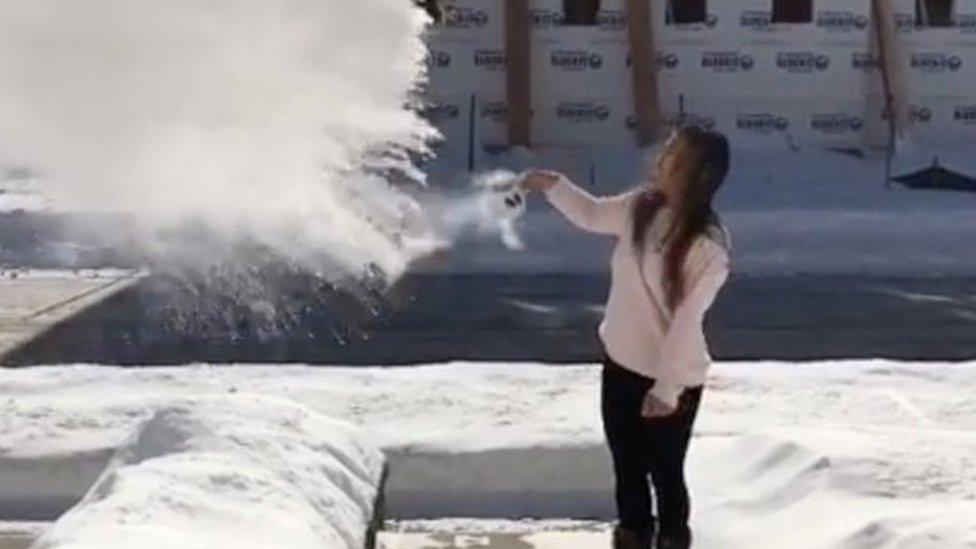Texas weather: Deaths mount as winter storm leaves millions without power
- Published
Frozen turbines and climate change: The politics behind the Texas power failure
A huge winter storm sweeping across the southern US has killed at least 21 people and left millions without power.
There have been widespread blackouts in Texas, where the energy grid was overwhelmed by a surge in demand.
Millions of people in the state, which rarely experiences such low temperatures, have been struggling to cope with the lack of power and frigid conditions.
The extreme weather is forecast to continue until the weekend.
Deaths attributed to the storm have been recorded in Texas, Louisiana, Kentucky, North Carolina and Missouri.
By Wednesday afternoon, the National Weather Service (NWS) said that the worst of the storm had moved through Texas, but kept more than 100 million Americans under a winter weather warning.
But historically low temperatures are expected to remain for days, the NWS said, with more than 71% of the US covered by snow.
Winter storm leaves millions of Texas residents without electricity
The freezing storm has even reached northern and central parts of Mexico, where millions of people have experienced days of intermittent power cuts.
"I'm in Houston, Texas freezing to death," one Twitter user, Chris Prince, wrote. "No power, no heat, no water. I have four young children. How is this happening right now?"
Another user, Josh Morgerman, wrote that a friend in Texas had resorted to "burning furniture in the fireplace" to stay warm.
A senior director for Ercot - the Electric Reliability Council of Texas - told CNN on Wednesday that Texans could continue to experience rotating power outages into Thursday.
Rotating outages are the "best case" scenario, Dan Woodfin said. "I don't think it's likely that we're going to have enough available based on our forecasts... and that we're going to have everybody back on today, or before at least the morning peak tomorrow".
Scientists have linked climate change to an increasing number of severe weather events worldwide, including hurricanes, heat waves and floods.
'Public health disaster'
The recorded deaths include people who have died in traffic accidents, as well as some who suffered carbon monoxide poisoning from running cars and generators indoors to stay warm.
"This is an absolute public health disaster," one medical official in Houston told the local television station KPRC-TV. "[Carbon monoxide poisoning] certainly happens when it gets cold, but never in these numbers.
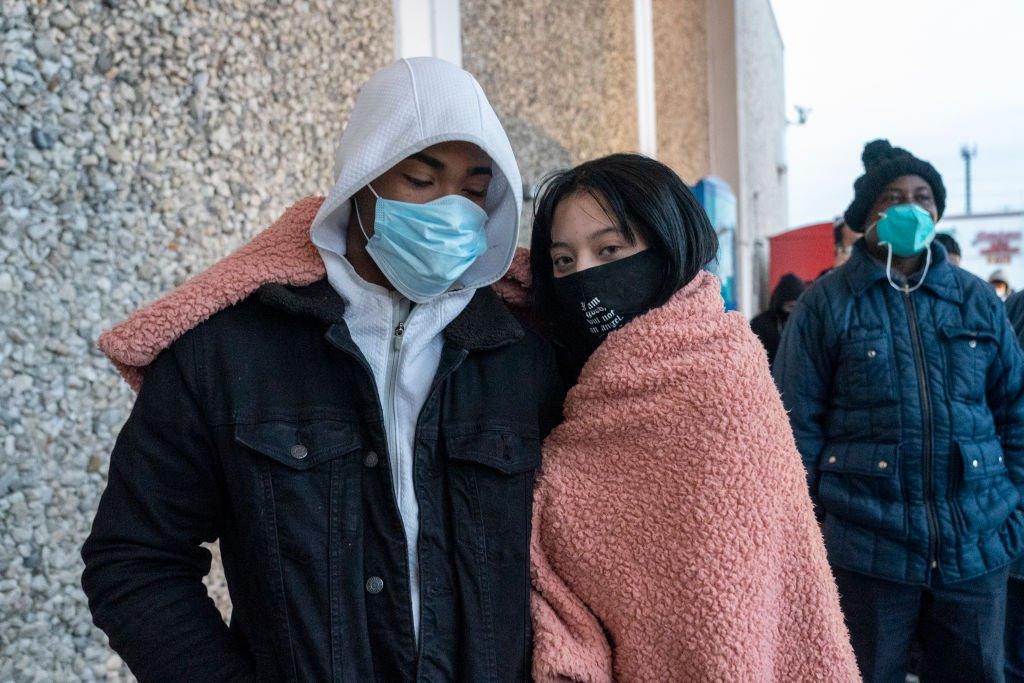
Queues have formed at shops in Texas where many are unused to freezing temperatures
One county said it had seen more than 300 suspected carbon monoxide cases during the cold snap. "It's turning into a mini mass casualty event," one Harris County doctor told the Houston Chronicle.
At least four people were killed following a house fire in Houston that officials said may have been sparked by candles. Separately, police said two men found alongside a Houston highway were believed to have died due to the cold.


Meanwhile in North Carolina, a tornado spawned by the same storm left three people dead and 10 injured.
The cold snap has also forced Covid-19 vaccination centres to close for several days and hindered deliveries of doses in a handful of US states. Some centres raced to use vaccines that could no longer be refrigerated at the required temperature.
How cold is it in Texas?
The state has seen some of its coldest temperatures in more than 30 years - some areas hit 0F (-18C) on Sunday - and US President Joe Biden earlier approved a state of emergency.
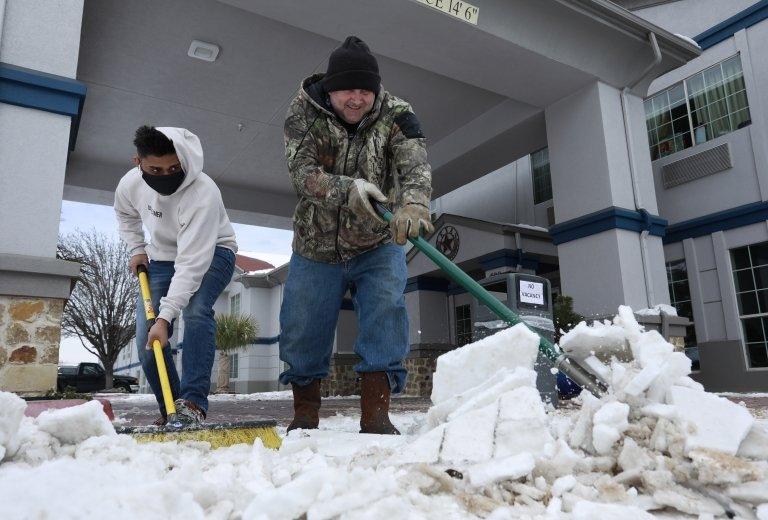
Many hotels in Texas are full with people who have no electricity at home
Some two million people in Texas are still without power. At a press conference on Wednesday afternoon, Governor Greg Abbott said that 1.2 million Texans have so far had their power restored, with more coming "on board".
The governor signed an executive order preventing any Texas natural gas from being exported outside of the state until 21 February.
Mr Abbott also told reporters that every source of power in Texas had been "compromised" - seemingly walking back earlier comments blaming renewable energy for the state's blackouts.
The scale of the power outage has prompted anger from some officials and residents. Mr Abbott has called the situation "unacceptable".
He called for an investigation into the Electric Reliability Council of Texas (Ercot), an energy co-operative responsible for the vast majority of the state's electricity to get to the "root of any missteps" that led to the widespread outages. He has told local media that the body should be reformed and its leaders should resign.
"This was a total failure," he told ABC News. "They showed that they were not reliable."
In a tweet on Tuesday, Ercot said it was "restoring load as fast as we can in a stable manner".
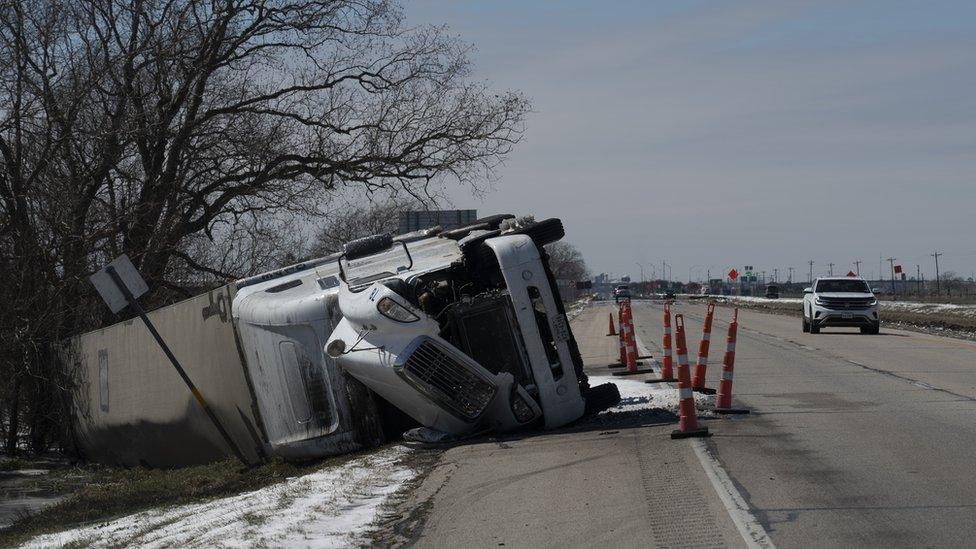
The snow and ice triggered a flurry of traffic accidents - such as this one in Pierce, Texas
Homes in the state are not normally insulated for cold weather, meaning that indoor temperatures in homes quickly dropped to freezing after heat systems failed. Frozen pipes also burst, despite attempts by some homeowners to insulate them from the cold using blankets.
Chuck Hairston, who lives in a suburb of Fort Worth, had been without electricity for about 31 hours when he spoke to the BBC on Tuesday.
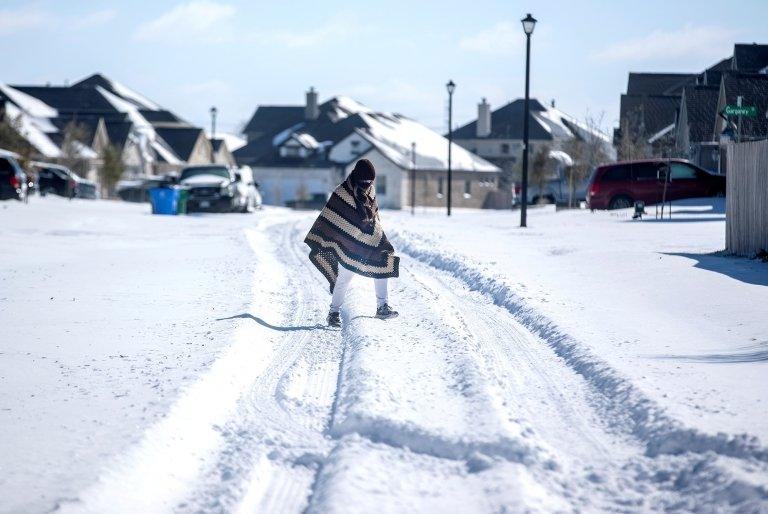
Neighbourhoods like this one in Pflugerville faced many hours without electricity
He said his family had slept beside the fireplace covered in "every blanket and pillow we could find in the house". He tried local hotels, but they were either fully booked or did not have electricity.
Icy roads have also led to a spate of traffic accidents and people have been advised to avoid travel where possible.


How are you coping with the freezing conditions where you are? Tell us by emailing: haveyoursay@bbc.co.uk, external.
Please include a contact number if you are willing to speak to a BBC journalist. You can also get in touch in the following ways:
WhatsApp: +44 7756 165803, external
Tweet: @BBC_HaveYourSay, external
Or fill out the form below
Please read our terms & conditions and privacy policy
- Published17 February 2021
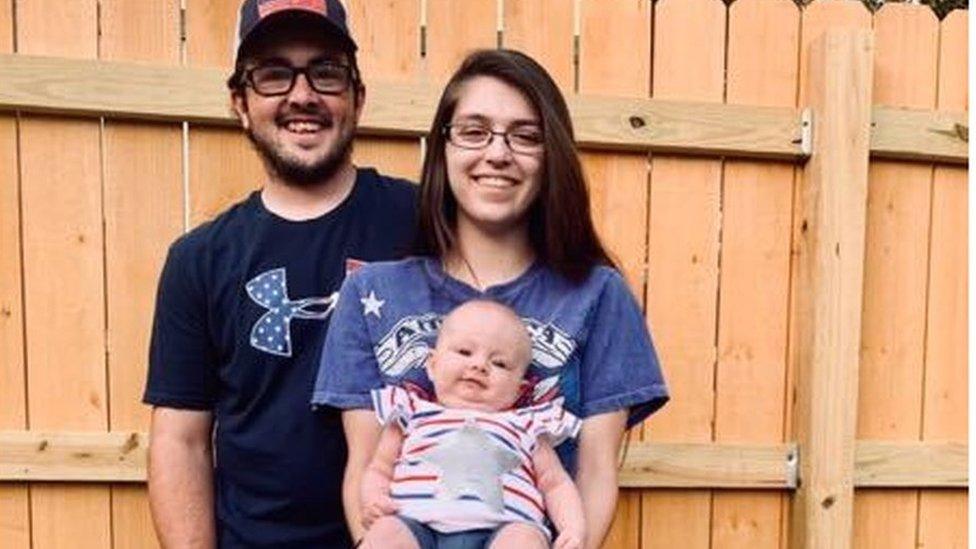
- Published17 February 2021
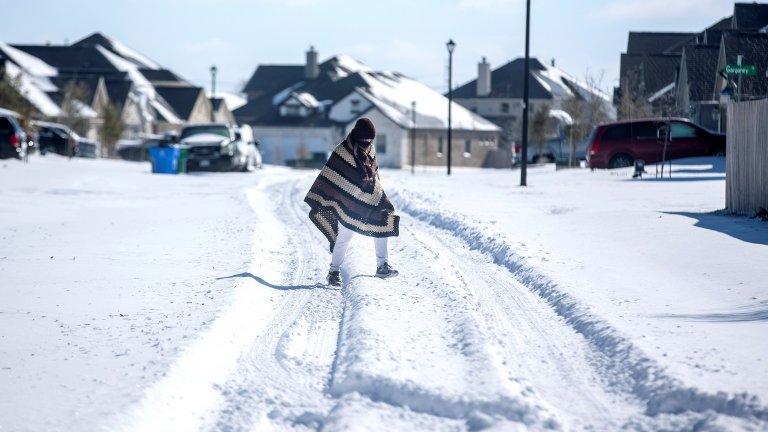
- Published16 February 2021
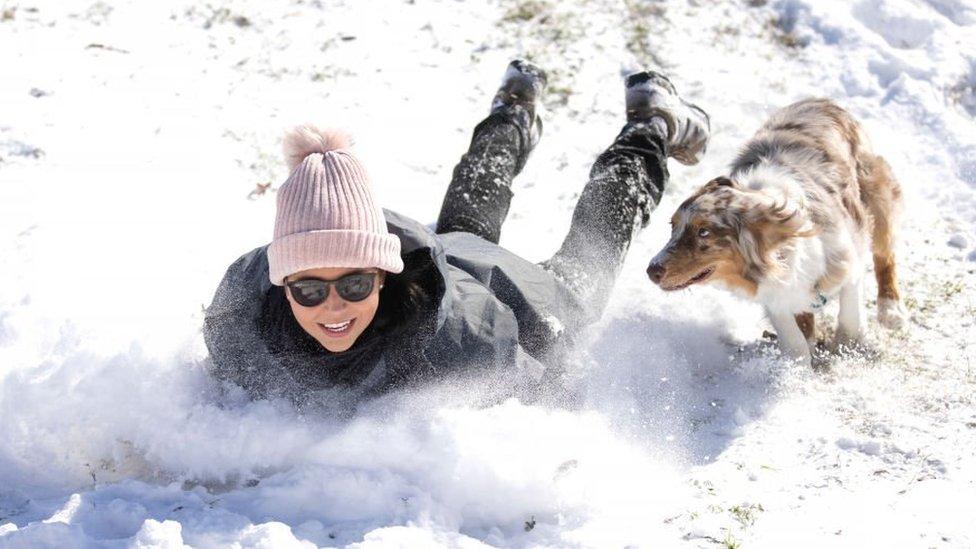
- Attribution
- Published14 February 2021
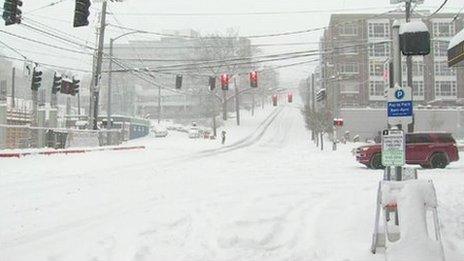
- Published29 January 2021
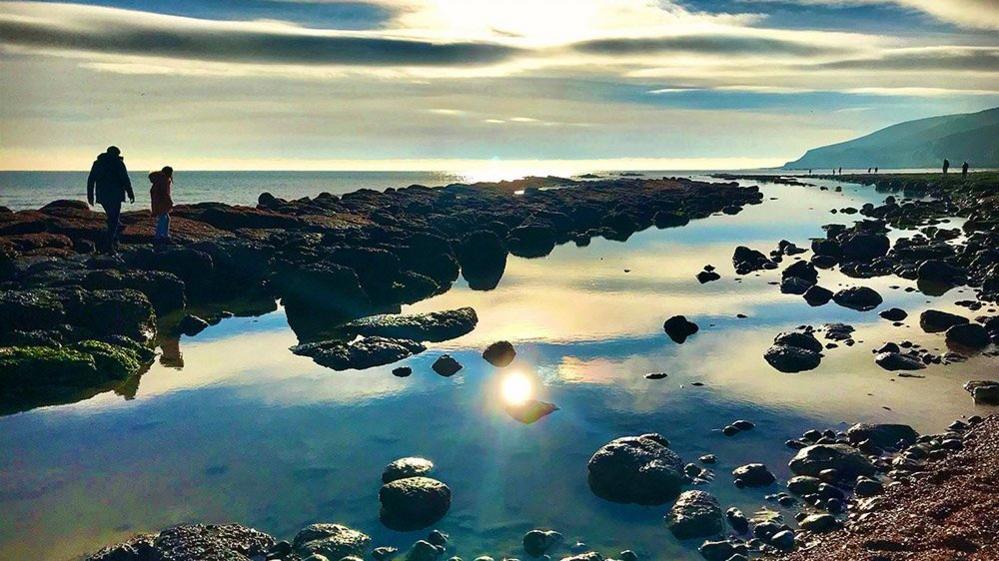
- Published31 January 2019
